Sales Engagement


The Appleton Greene Corporate Training Program (CTP) for Sales Engagement is provided by Mr. Phillips and Mr. Brook Certified Learning Provider (CLP). Program Specifications: Monthly cost USD$2,500.00; Monthly Workshops 6 hours; Monthly Support 4 hours; Program Duration 12 months; Program orders subject to ongoing availability.
Personal Profile

Mr. Phillips is a dynamic executive leader with extensive experience in the contemporary management of people and projects. He demonstrates an ability to consistently deliver outstanding value and profitable growth for both corporate and government organisations.
With a background in business consulting spanning 30 years, Mr. Phillips is a senior sales professional, business analyst and project manager with an impressive track record of delivering value propositions and change agendas.
Honest, outcome-orientated, and intensely passionate about providing constructive support to his team, Mr. Phillips provides inspirational leadership by setting a clear vision and driving a culture of excellence. With an innate ability to identify and diagnose business problems and create scalable and profitable solutions for his clients, Mr. Phillips has earned a reputation as a trusted advisor, integral to his client’s overall business strategies.
Widely recognised as a thought leader, Mr. Phillips has provided strategic guidance to CEOs and organisations, including Unisys, Kyndryl, Infosys, Adobe, Clearbox Systems, Dtex Systems, NTT and Readify. Mr. Phillips is recognised as a leader in his field and one of Australia’s most sought-after sales engagement professionals.
Author of his own book, Mr. Phillips has reimagined the engagement between sellers and buyers, focusing on transparency, growth, engagement and accountability.

Mr. Brook is a seasoned professional passionate about driving business transformation and improving performance through data and technology. With extensive business management experience in a large global organisation, he has successfully led teams across diverse functions.
Mr. Brook is an experienced presenter, facilitator, and collaborator with strong interpersonal and communication skills. He has provided consulting services to public, health, education, transport, and private sectors to improve performance through data-driven solutions and technology.
Mr. Brook is a Co-founder and Director, and was a Senior Associate for Business and Technology Strategy at D2 & Associates. Before these roles, Mr. Brook worked as a Technology Advisory for Strategic Accounts at Telstra and an Enterprise Architect and Solution Sales Specialist at NTT and Data#3.
He has been referenced in two publications and is an active podcaster and thought leader in emerging technologies, leadership, and management. Mr. Brook has co-developed the Engagement Excellence mindset with Mr. Phillips.
He holds a Master in Networking and Systems Administration and completed the Graduate Company Directors Course from the Australian Institute of Company Directors. Mr. Brook also holds various technology, sales, and architecture certifications.
To request further information about Mr. Phillips and Mr. Brook through Appleton Greene, please Click Here.
(CLP) Programs
Appleton Greene corporate training programs are all process-driven. They are used as vehicles to implement tangible business processes within clients’ organizations, together with training, support and facilitation during the use of these processes. Corporate training programs are therefore implemented over a sustainable period of time, that is to say, between 1 year (incorporating 12 monthly workshops), and 4 years (incorporating 48 monthly workshops). Your program information guide will specify how long each program takes to complete. Each monthly workshop takes 6 hours to implement and can be undertaken either on the client’s premises, an Appleton Greene serviced office, or online via the internet. This enables clients to implement each part of their business process, before moving onto the next stage of the program and enables employees to plan their study time around their current work commitments. The result is far greater program benefit, over a more sustainable period of time and a significantly improved return on investment.
Appleton Greene uses standard and bespoke corporate training programs as vessels to transfer business process improvement knowledge into the heart of our clients’ organizations. Each individual program focuses upon the implementation of a specific business process, which enables clients to easily quantify their return on investment. There are hundreds of established Appleton Greene corporate training products now available to clients within customer services, e-business, finance, globalization, human resources, information technology, legal, management, marketing and production. It does not matter whether a client’s employees are located within one office, or an unlimited number of international offices, we can still bring them together to learn and implement specific business processes collectively. Our approach to global localization enables us to provide clients with a truly international service with that all important personal touch. Appleton Greene corporate training programs can be provided virtually or locally and they are all unique in that they individually focus upon a specific business function. All (CLP) programs are implemented over a sustainable period of time, usually between 1-4 years, incorporating 12-48 monthly workshops and professional support is consistently provided during this time by qualified learning providers and where appropriate, by Accredited Consultants.
Executive summary
Sales Engagement
This program suits companies worldwide and is designed to be quickly and easily incorporated into your current business framework. It challenges traditional sales training methods by helping leaders take a fresh and practical look at how to be more effective across the enterprise and create a culture of purpose-driven sales.
Traditional sales methodologies cannot adapt to the changing business landscape, where clients seek partners that can deliver not just products but strategic outcomes and solutions that align with their long-term goals. It underscores the need for a sales approach that is considered, client-focused, and adaptable to the complex and rapidly evolving market dynamics and particularly the changing demographic of buyers.
To do this successfully, you need a simple, repeatable process and a single, universal metric that shows the entire organisation your ‘Right-to-Win©’ on any given bedrock deal so that you can allocate your resources where they are most effective.
History
The traditional landscape of corporate sales was dominated by methodologies rooted in aggressive tactics, focusing predominantly on closing deals rapidly and fostering the archetype of the ‘hero’ salesperson. This approach exalted the individual achiever, creating environments where the success of sales efforts was often attributed to the prowess and persuasive capabilities of singular talents rather than a cohesive team strategy. Such methodologies heavily relied on high-pressure tactics, aiming to secure quick wins rather than nurturing long-term client relationships. Training programs from this era reflected these priorities, concentrating on developing aggressive selling skills, mastering the art of the pitch, and overcoming objections to close deals at all costs. This period was characterised by a significant informational asymmetry, where customers, having limited access to independent information, were largely dependent on sales representatives for insights, product knowledge, and solutions. Armed with superior information, the salesperson acted as the gatekeeper, influencing customer decisions significantly. However, this model often led to transactional relationships, prioritising short-term gains over sustainable customer value and loyalty.
Current Position

Customers today expect sales representatives to understand their business intimately, recognise the nuances of their market and align solutions precisely to their strategic and operational priorities. However, there’s a prevailing disconnect, as sales strategies often do not mirror this shift, continuing to treat sales engagements as opportunities to push products rather than as platforms to build meaningful, consultative relationships attuned to the client’s specific needs and contexts.
The current way of selling is fundamentally flawed due to several pervasive issues within the sales industry. These challenges include:
A Short-Term View: The industry’s focus on 12-month targets encourages a narrow perspective that overlooks long-term client outcomes and strategic imperatives. This approach results in sales strategies disconnected from the evolving needs of clients and the market. This implies that sales strategies have a beginning, middle and end; this is incorrect. Sales strategies must be a continuum with client and company outcomes in the centre.
The “Hero”: The misconception that individual “hero” salespeople can single-handedly drive success leads to a culture that overvalues short-term wins and undervalues planning, team collaboration, and process adherence.
Relationship Only Selling: A reliance on personal relationships over substantial, value-driven client engagements. While relationships are important, they must be grounded in credibility and a deep understanding of the client’s business needs and goals to be effective.
An Opportunistic Mentality: Salespeople who focus exclusively on immediate opportunities without considering the client’s broader goals or the vendor’s long-term relationship with the client. This approach limits the ability to deliver meaningful, value-added solutions and can lead to commoditised, price-driven orphan deals.
Commoditised Delivery: A failure to differentiate offerings in a market where delivery talent and capabilities can be similar across providers. Success requires developing and delivering solutions that align closely with the client’s strategic imperatives rather than competing solely on price or product features.
Ineffective Account Plans: Traditional account plans are often static, backward-looking documents that avoid predicting or anticipating future client needs or market trends. Effective account planning requires a forward-looking approach that considers global, national, and regional trends affecting the client’s industry and devises strategies that align the vendor’s offerings with the client’s future state.
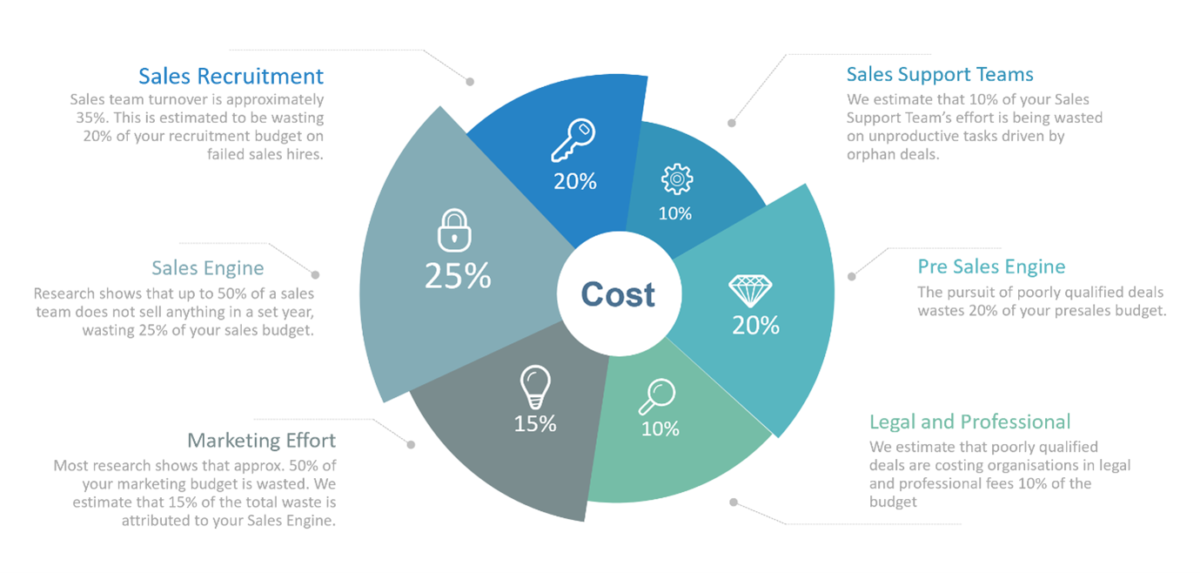
Figure 1 What is this costing you?
Companies have become tolerant towards or unaware of the hidden costs associated with sales inefficiencies. Costs aside (see Figure 1), this does not consider the opportunity cost of lost deals. We have reached the point where continuing with this crippling behaviour is unsustainable, and a new future of how sales are conducted must be considered.
Future Outlook

The future sellers must embody the role of Client Experts, who are not only experts in their offerings but are also deeply versed in their clients’ industries, challenges, and goals. Sales is an organisational responsibility in which Executives, Solution Masters and Client Experts coordinate messaging around Strategic Imperatives, Tailored Solutions and Emerging Needs such that the client builds confidence in the organisation, not just the sellers, products or services.
Engagement Excellence will hinge on the ability to foster authentic partnerships with clients, characterised by a mutual commitment to achieving long-term success through solutions that are effective and strategically aligned with both parties’ long-term visions. It’s a continuum.
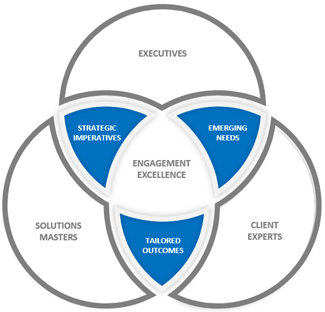
Organisations with the leadership capacity to challenge how they are selling and understand the need for fundamental change will have a significant advantage in an information-rich world.
They will achieve greater predictability in their performance, allowing for planning and adaptation to client needs. This deliberate shift will enable them to build value with their clients—value clients are willing to pay for—resulting in healthy margins, profits, and a solid market reputation. Such organisations will attract and retain top talent, essential for long-term success and sustainability. That is why this course aims to change the way the world sells.

Case Study 1:
Transforming Sales Strategy in the Technology Sector
Client:
In a highly competitive industry, a mid-sized software development company faces stagnant sales and market share erosion.
Challenges:
• Inefficient sales processes and reliance on outdated sales methodologies.
• Difficulty in distinguishing their offerings in a crowded market.
• Struggle to effectively communicate value to potential clients.
Sales Engagement Solutions:
• Implemented a comprehensive sales training program focused on Engagement Excellence to redefine the company’s sales approach.
• Introduced a universal sales metric to align the entire organisation’s efforts towards impactful outcomes.
• Leveraged the Right to Win Analysis to refine sales messaging, focusing on their unique value proposition.
Results:
• A 25% increase in sales within the first six months post-implementation.
• Enhanced sales team efficiency, enabling them to do more with less and significantly reducing the sales cycle time.
• Improved market positioning, establishing itself as a thought leader in software innovation.

Case Study 2:
Transforming Sales Strategy for a Global IT Recruitment Firm.
Client:
A global IT recruitment company was on a mission to increase its Annual Recurring Revenue (ARR) by 700% over five years. The ambitious strategy required a new sales approach and new market offerings that enhanced performance while maintaining lean Sales, General, and Administrative (SG&A) costs.
Challenges:
• Achieving a significant ARR increase within a tight timeframe without proportionally increasing SG&A expenses.
• The existing sales strategy was not equipped to support the company’s aggressive growth ambitions.
• A need for a sales strategy that was both efficient and effective in a highly competitive market.
• Maintaining current business performance while introducing new services.
Our Solutions:
To address these challenges, Sales Engagement introduced a transformative sales enablement training program focused on:
• Concentrating the sales team’s efforts on the critical metric of their Right-To-Win© for each deal, ensuring optimal resource allocation.
• Implementing the Power Plan, utilising four essential metrics to cultivate a culture of purposeful sales and impactful measurement.
• Equipping the sales team with Client Expert competencies, significantly enhancing their sales performance and competitive advantage in the market. This development aimed to deepen customer engagement and elevate client satisfaction ratings through superior understanding and tailored solutions.
Results:
• The company embarked on a successful path toward the 700% ARR goal, with the new strategy showing promising early results in sales performance.
• Focusing on the Right-To-Win© metric led to smarter deal selections and a higher win rate, demonstrating a shift in pursuit planning.
• The introduction of the Power Plan provided a clear and scalable framework for executing the company’s growth strategy, aligning sales efforts with aggressive targets.
• The adoption of Client Expert competencies transformed the sales team into trusted advisors for their clients, resulting in deeper engagement and significantly improved client satisfaction ratings. This advantage not only differentiated the company in the competitive market but also contributed to long-term customer relationships and loyalty.
The initiative marked a paradigm shift in the company’s sales culture, transitioning from an input-based approach to impact-based engagements underpinned by a deep understanding of client needs and a commitment to delivering exceptional value.
Curriculum
Sales Engagement – Part 1- Year 1
- Part 1 Month 1 Sales Transformation
- Part 1 Month 2 Engagement Excellence
- Part 1 Month 3 Client Profiles
- Part 1 Month 4 Client Expert
- Part 1 Month 5 Money Matters
- Part 1 Month 6 Client Value
- Part 1 Month 7 CEO-Sales Plan
- Part 1 Month 8 Attainment Plan
- Part 1 Month 9 Team Plan
- Part 1 Month 10 Pursuit Plan
- Part 1 Month 11 Power Plan
- Part 1 Month 12 Getting Started
Program Objectives
The following list represents the Key Program Objectives (KPO) for the Appleton Greene Sales Engagement corporate training program.
Sales Engagement – Part 1- Year 1
- Part 1 Month 1 Sales Transformation – Transforming Sales for Modern Success – The Sales Transformation workshop introduces participants to EngageX’s innovative sales methodologies, including The Right Model and The Right Tools. It focuses on transforming traditional sales tactics into a calculated, client-centric approach that emphasises creating value and measuring impact over activities. Participants learn to implement the Right-to-Win score, which measures deal potential based on impact rather than activity alone. This workshop lays the foundation for the entire Sales Enhancement Program, providing a comprehensive introduction to transforming sales processes to achieve sustained business success and long-term client relationships.
- Part 1 Month 2 Engagement Excellence – Building Client Relevance – The Engagement Excellence workshop delves into the six lenses of Engagement Excellence, essential for building client relevance. Participants will learn to enhance interactions between executive, sales, and solutions teams, ensuring high-impact and meaningful engagements. The workshop provides actionable plans to drive consistent results and improve client relationships by fostering an Engagement Excellence mindset. This approach ensures that organisations can align their sales efforts with market demands and client needs, promoting a culture of excellence and continuous improvement.
- Part 1 Month 3 Client Profiles – Tailoring your sales to increase relevance and avoid traps – The Client Profiles workshop offers an in-depth analysis of various client types, helping participants tailor their sales strategies effectively. It covers the identification of client types, potential traps such as the Incumbency and Margin traps, and strategies to avoid them. By mastering client profiling, sales teams can align their approaches with specific client needs, enhancing their effectiveness and fostering long-term client satisfaction and loyalty. This understanding ensures that solutions are deeply integrated into clients’ operations.
- Part 1 Month 4 Client Experts – The new skills for successful sales – The Client Experts workshop focuses on developing the seven competencies necessary for becoming a trusted advisor. Participants will explore roles such as Investigator, Brand Advocate, and Team Player, as well as essential skills such as Business Acumen, Leadership and Ethics, and Sales Planning. The aim is to equip participants with the knowledge and capabilities to build impact and maintain strong, effective client engagement, ensuring they can deliver long-term value.
- Part 1 Month 5 Money Matters – Navigating the budget discussions with Buyers, Beneficiaries and Backers – The Money Matters workshop addresses the financial aspects of sales, focusing on identifying Buyers, Beneficiaries, and Backers, and understanding budget allocations. Participants will learn techniques to uncover financial motivations, secure budgets, and align their activities with clients’ strategic imperatives to achieve high impact. Practical tools are provided to navigate budget discussions, ensuring that sales efforts are directed towards opportunities with viable financial backing, ultimately increasing the likelihood of closing deals.
- Part 1 Month 6 Client Value – Moving from ALL to ONLY – The Client Value workshop teaches participants how to develop and communicate compelling value propositions. It covers value development, general and win themes, and the creation of narratives that resonate with clients. By understanding and articulating the unique value their solutions bring, sales teams can better align with client needs and differentiate themselves from competitors, enhancing their ability to earn client loyalty and drive business growth.
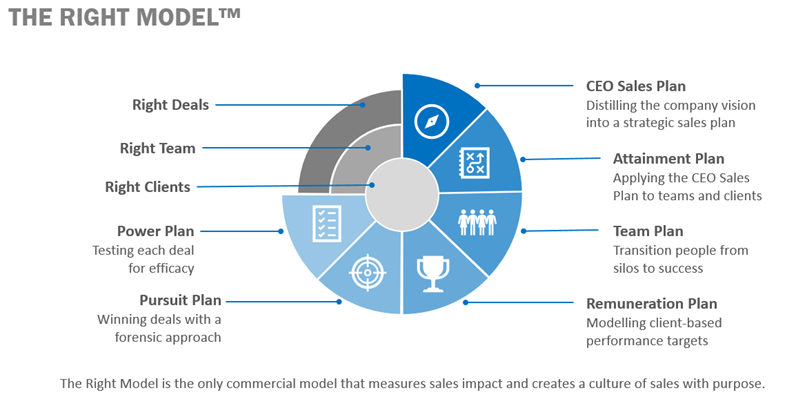
Figure 4 The Right Model
- Part 1 Month 7 CEO-Sales Plan – Executive level sales strategy – The CEO Plan workshop helps participants develop a comprehensive sales strategy from an executive perspective. It focuses on aligning sales initiatives with the organisation’s goals, ensuring leadership support and buy-in. Participants will learn to craft and implement a CEO-level sales plan that drives organisational alignment and enhances focus. This workshop equips participants with the tools necessary for sales planning at the highest level, fostering long-term business success.
- Part 1 Month 8 Attainment Plan – Achieving the strategy in your market – The Attainment Plan workshop teaches participants how to set and achieve ambitious sales goals. The workshop covers methodologies for goal setting, tracking progress, and adjusting strategies to meet targets. By focusing on both short-term and long-term objectives, participants develop a clear roadmap for success. This workshop provides practical tools for maintaining focus, motivation, and accountability within sales teams, ensuring consistent achievement of sales targets.
- Part 1 Month 9 Team Plan – Building sales with purpose across your organisation – The Team Plan workshop fundamentally changes the traditional sales approach by involving the entire organisation in a coordinated effort to pursue Bedrock Deals. It delineates roles within the company into delivery and pursuit, ensuring everyone from the CEO to the receptionist is involved in sales in a structured manner. A team remuneration plan focuses on aligning compensation with team success and client outcomes rather than individual performance. Key components include The Right Contribution, Success Contribution, Pool Component, and Evolve Component. This structure fosters collaboration, long-term employment, and alignment with the company’s goals. This collaborative approach enhances overall pursuit effectiveness and fosters a culture of teamwork and shared success.
- Part 1 Month 10 Pursuit Plan – The home of the Bedrock deals that will change your business – The Pursuit Plan workshop guides participants in developing and executing long-term plans for pursuing Bedrock deals. The workshop covers the identification of high-value targets, the development of pursuit strategies, and the management of pursuit activities. By focusing on deal planning and execution, participants will be better equipped to secure significant sales wins. This workshop provides the skills and frameworks necessary for managing complex sales pursuits effectively.
- Part 1 Month 11 Power Plan – A single, organisational-wide metric to drive sales with purpose – The Power Plan workshop evaluates the potential of deals through the lenses of Credibility, Capability, Commitment, and Control—the 4Cs. This workshop teaches participants to use the Right-to-Win score as a comprehensive metric to assess deal potential and align resources effectively. By continuously monitoring and refining sales strategies based on these metrics, participants can improve their chances of securing significant deals. The Power Plan ensures that sales efforts are calculated, impactful, and aligned with organisational goals.
- Part 1 Month 12 Getting Started – Laying the foundation for the Right Team, the Right Clients and the Right Deals – The Getting Started workshop provides participants with a roadmap for initiating and sustaining sales transformation within their organisation. It covers planning and executing transformation initiatives, including goal setting, securing executive buy-in, and managing change. Participants will learn to lay the groundwork for successful sales transformation, ensuring their organisation is prepared to implement and sustain new sales strategies. This workshop equips participants with the knowledge and tools necessary to kick-start their sales transformation journey.
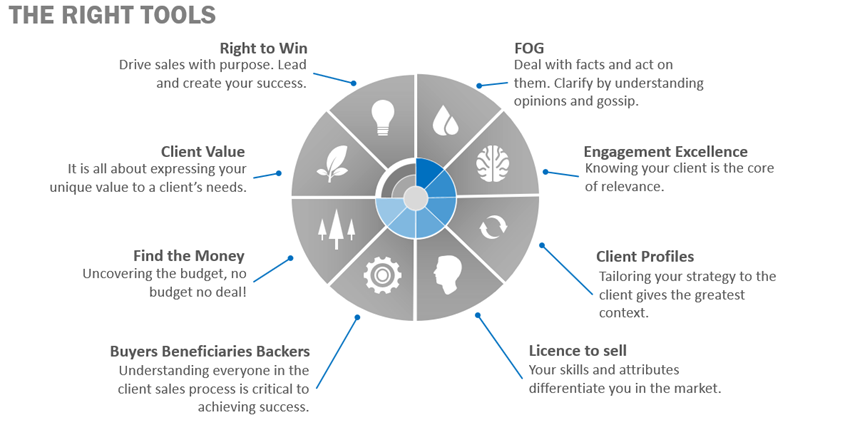
Figure 3 The Right Tools
Methodology
Sales Engagement
Our methodology uses six adult learning principles of Andragogy (by Malcolm Knowles):
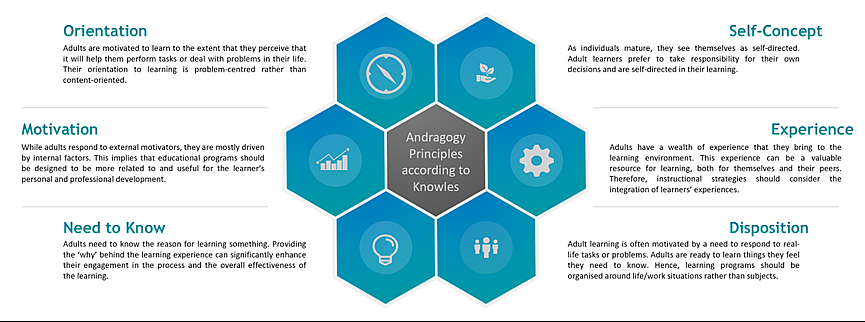
Figure 5 – Based on The Adult Learner by Malcolm Knowles, Elwood Holten and Richard Swanson
Program Planning
All Sales Engagement programs begin with an interactive planning session to capture the exact needs of the participants and ensure relevance. The facilitator will uncover your needs and then incorporate these into the entire training initiative. This involves identifying the specific needs and challenges, setting clear, measurable goals, and defining the key outcomes expected from the program. Attendee engagement ensures alignment and buy-in with these new business strategies. The planning session also includes logistical considerations, including scheduling, budgeting, and resource allocation, and ensuring the program structure mixes tactical, strategic, and practical. By thoroughly understanding the client’s context and desired impacts, the program is tailored to address your unique needs, setting a solid foundation for transformative learning and development.
Program Development
The Sales Engagement methodology is translated into a structured, comprehensive training curriculum in the Program Development stage to meet the identified goals. This involves clear program content delivered in interactive workshops aimed at enhancing the participants’ skills and knowledge in line with the Engagement Excellence mindset. Special attention is given to ensuring the content is engaging, actionable, and aligned with real-world business scenarios, thereby facilitating a learning experience that is both informative and practically applicable. Customisation is critical in this phase, ensuring the program resonates and addresses the specific challenges and opportunities.
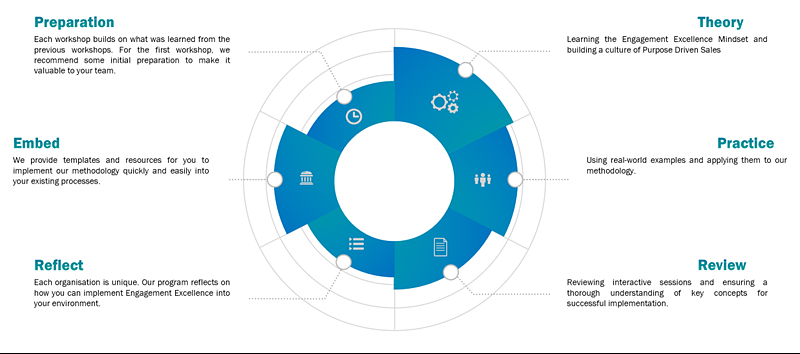
Figure 6 Program Implementation Method
Program Implementation
This program is delivered in person as monthly interactive workshops. Each workshop introduces new concepts that build on previous learning and provides you with the knowledge, skills, and resources to incorporate the concepts into your organisation’s day-to-day operations.
During workshops, participants are asked to use current examples of opportunities the business is working on and apply these real-world scenarios to our methodology. These interactive sessions ensure participants gain practical experience and begin building new initiatives right away.
We recommend that participants include leadership, sales leadership, and product/service leadership to get the most out of the program. At the end of each workshop, you are given a Project Study to consolidate your understanding of workshop concepts and prepare for the next workshop. The project study involves conducting analyses, redesigning processes, assessing resources, developing communication plans, and improving customer engagement using learned methodologies. This practical application ensures deeper comprehension and successful implementation.
Program Review
The final stage, Program Review, is where the overall success and impact of the training program is evaluated. This involves collecting and analysing participant feedback, assessing their performance and improvement, and measuring the program’s outcomes against the initial objectives. Key performance indicators are reviewed to understand the program’s effectiveness in enhancing skills, knowledge, and business outcomes. This phase is crucial for identifying best practices, lessons learned, and areas for improvement. Insights gained from the review inform future training initiatives, ensuring continuous improvement and alignment with evolving business needs. The review process not only assesses the program’s immediate impact but also considers its long-term contributions to the participants’ professional growth and the organisation’s objectives.
AGC has strict quality management protocols to ensure you get the best training. Therefore, AGC proactively gathers this information from succinct and time-effective monthly program performance questionnaires, which are then forwarded to the Learning Provider for continuous improvement purposes.
AGC writes to you directly every six months, asking you to complete a straightforward Testimonial Form, which only takes 10-15 minutes. The form is structured to provide AGC with valuable references or testimonials without taking too much of your time. Your personal and company names are then removed to ensure confidentiality, in accordance with our privacy and security policy, before they are published online.
Industries
This service is primarily available to the following industry sectors:

Information Technology (IT)
History – The Information Technology (IT) sector has been in a period of remarkable growth and innovation, characterised by the advent of cloud computing, big data analytics, artificial intelligence (AI), and the Internet of Things (IoT). These technologies have fundamentally transformed the digital landscape, enabling more scalable and efficient IT infrastructures, revolutionising mobile computing, and emphasising the importance of cybersecurity. The era has seen AI move from research labs into practical business applications, while IoT has bridged the gap between the digital and physical worlds, leading to smart environments. This rapid evolution has not only reshaped industries and business models but also raised critical discussions around privacy, ethics, and future work. The last ten years in the IT sector highlight an ongoing journey of human ingenuity, setting a foundation for future technological advancements and societal impact.
Current Position – The IT sector is a cornerstone of the global economy, driven by advancements in software development, cloud computing, data analytics, and artificial intelligence. Sales strategies in this sector are highly sophisticated, focusing on understanding customer needs, providing integrated solutions, and demonstrating the transformative power of technology. Sales training now emphasises digital literacy, business acumen, and the ability to navigate complex solution ecosystems. Performance metrics often revolve around long-term customer relationships, subscription models, and the successful implementation of technology solutions that drive business growth. However, margin pressure and commoditisation make it increasingly difficult to differentiate in this highly competitive and ever-evolving market.
Future Outlook – The IT sector is poised for continued expansion and innovation, with emerging technologies like quantum computing, blockchain, and the Internet of Things set to redefine the industry. Sales strategies must adapt to these changes, focusing on the value and security these technologies bring to businesses and consumers. Sales training will increasingly need to incorporate up-to-date technological knowledge, ethical considerations, and the ability to sell complex, futuristic technologies. The IT sector’s sales performance will be measured in financial terms, as well as its ability to contribute to societal advancements and solve global challenges.
The role of product and solutions is also integrated into the sales process as companies must demonstrate their ability to tailor solutions, deliver on budget, and actively assist with cost reduction and process automation for customers. Following closely with some of the predictions made in Consumption Economics (Authored by Todd Hewlin, J.B. Wood, Thomas Law, 2011), this sector must operate at a higher risk for consumers to continue purchasing.

Business Consulting
History – The Business Consulting sector has significantly evolved, shifting from focusing on operational efficiencies to providing advice on digital transformation, sustainability, and customer engagement. The advent of digital technologies has broadened consulting services to include specialties like analytics and cybersecurity. Meanwhile, sustainability and corporate responsibility have become key components of planning. The rise of niche consultancies has introduced innovative and personalised solutions, challenging the dominance of traditional firms. This transformation underscores the sector’s move towards agility, innovation, and a deeper, collaborative approach with clients, positioning consulting services as crucial navigators in the digital and sustainable business landscape.
Current Position – The Business Consulting sector encompasses various services, including strategy, operations, technology, and human resources consulting. The sector thrives on adapting to changing market conditions and offering insights and solutions that enhance client competitiveness. Sales strategies now integrate a consultative approach, focusing on understanding the client’s business challenges and crafting customised solutions. Sales training emphasises a blend of industry expertise, problem-solving skills, and the ability to communicate complex ideas effectively. Performance metrics in consulting often focus on the tangible value delivered to clients, such as increased efficiency, growth, or profitability. Major brand consulting companies have suffered recent setbacks due to unethical behaviour, price gauging and market manipulation. Niche consultancies have benefited from this over-reliance on big brand companies to show that more innovative alternatives are available. A risk that must be attended to is that many individuals from the larger firms now make up the niche players and may bring these destructive behaviours with them.
Future Outlook – The future outlook for Business Consulting is marked by the sector’s continued evolution towards digital transformation and sustainability. As businesses face increasing complexity and global challenges, consultants must provide strategic guidance on digital innovation, cybersecurity, environmental sustainability, and social responsibility. Sales strategies will increasingly rely on demonstrating expertise in these emerging areas, along with the traditional focus on improving business performance. Sales training must evolve to include digital competencies, sustainability practices, and the ability to navigate global regulatory environments. Additional pressure will be placed on business consulting by contextualised, AI-driven data presentation that could replace much of the business consulting intellectual property. Reusing boilerplate strategy papers will not be accepted in the future marketplace. The sector’s performance will be measured by its success in helping clients achieve contextual, long-term, sustainable growth in an increasingly complex and interconnected world.

Professional Services
History – In the last decade, the Professional Services sector has been influenced by technological advancements and shifting client expectations. Firms have expanded their offerings beyond traditional legal, accounting, and engineering services to include digital solutions, data analytics, and comprehensive advisory services addressing complex business challenges. The integration of technology, particularly in areas such as artificial intelligence and cloud computing, has not only streamlined operations but also enabled the delivery of more sophisticated, customised client solutions. Additionally, the sector has seen a growing emphasis on strategic partnerships and collaborative models to offer end-to-end solutions. This evolution reflects the sector’s adaptation to a dynamic business environment, emphasising the importance of innovation, technology integration, and client-centric service models for future growth and competitiveness.
Current Position – Today, the Professional Services sector encompasses many services, including legal, accounting, architectural, engineering, and consulting. The sector has seen significant growth and diversification, driven by globalisation, technological advancements, and increasing business complexity. Modern sales strategies in this sector are more sophisticated, often involving a mix of relationship building, thought leadership, and solution selling. Training for professionals now includes technical skills, soft skills, business development strategies, and digital literacy. Performance metrics have evolved to include client satisfaction, repeat business, and the ability to deliver innovative solutions.
Future Outlook – The Professional Services sector will be shaped by further technological innovation, the increasing importance of interdisciplinary solutions, and the need for global regulatory compliance. Emerging technologies such as AI, blockchain, and big data analytics offer opportunities and challenges by automating routine tasks while requiring new services and expertise. Consistent with other industry sectors, contracts will evolve to be dynamic to ensure relevance over time. Sales strategies must adapt by focusing more on demonstrating value through innovation, customisation, and partnerships. Training will increasingly need to address the integration of technology into service delivery, alongside continuous learning in new regulatory and compliance areas.

Software Industry
History – The software Industry has experienced exponential growth and transformation, driven by the rapid development of cloud computing, mobile applications, and software as a service (SaaS) models. These innovations have shifted the industry from traditional, license-based software distribution to subscription models, offering scalable and accessible solutions for businesses and consumers alike. The rise of artificial intelligence (AI) and machine learning has further revolutionised software capabilities, enabling more personalised and efficient user experiences. Additionally, open-source communities and platforms have flourished, fostering collaboration and accelerating technological advancement. This era has underscored the critical role of software in enabling digital transformation across all sectors, with an ongoing emphasis on agility, user-centric design, and continuous innovation to meet evolving needs and challenges.
Current Position – The global economy relies highly on the software industry, characterised by its diversity, from system and application software to cloud computing and software as a service (SaaS), which challenges traditional security and economic borders. The industry’s strategies have evolved into direct sales, online sales, and partnership ecosystems, emphasising subscription models, customer success, and long-term relationships. Sales training now focuses on consultative selling, understanding customer needs, and articulating value propositions that resonate with those needs. Performance metrics increasingly prioritise customer acquisition cost (CAC), lifetime value (LTV), churn rate, and customer satisfaction.
Future Outlook – The Software Industry continues innovation and growth driven by emerging technologies such as artificial intelligence, machine learning, the Internet of Things, and blockchain. Sales strategies must adapt to these technological advancements, focusing on impact-based selling that addresses complex customer challenges and creates value through digital transformation. Sales training will increasingly emphasise agility, technological literacy, and omni-channel customer engagement. The industry’s performance will be measured by its ability to drive innovation, adapt to changing market demands, and contribute to the digital economy’s growth.

Leadership and Development
History—The Leadership and Development industry has significantly evolved, shifting from traditional training methods to focus on holistic development, digital learning platforms and fostering a culture of continuous improvement. The incorporation of technology, especially through e-learning and virtual reality, has made development programs more accessible and engaging. There’s been a growing emphasis on soft skills, such as emotional intelligence and adaptability, which are critical in navigating the complexities of modern workplaces. Furthermore, the sector has expanded to address leadership in diverse and inclusive environments, recognising the need for leaders who can navigate cultural differences and promote equity. This period highlights a transition towards developing leaders who are not just strategic thinkers but also empathetic and agile, prepared to lead in a rapidly changing global business landscape.
Current Position – The Leadership and Development sector is a critical component of organisational strategy, emphasising the cultivation of leadership at all levels, emotional intelligence, and the development of soft skills alongside technical expertise. Modern sales strategies in this sector are consultative, focusing on understanding each organisation’s unique challenges and goals. Sales training now emphasises building relationships, understanding client needs, and customising solutions that align with organisational culture and objectives. Performance metrics in this sector focus on the tangible impact of training programs, such as improved leadership effectiveness, employee engagement, and organisational performance.
Future Outlook – The Leadership and Development sector’s growth is an increasing recognition of the importance of diverse and inclusive leadership, continuous learning, and adaptability in a rapidly changing global business environment. Sales strategies will evolve to highlight the role of leadership development in driving innovation, navigating digital transformation, and fostering credibility. Sales training must adapt by incorporating cutting-edge learning technologies, such as AI-driven personalised learning experiences. The sector’s performance will be measured by its ability to develop leaders who can effectively lead diverse teams, drive triple-bottom-line performance and navigate the complexities of the global marketplace.
Locations
This service is primarily available within the following locations:

New York – United States of America
History – New York has been an epicentre of global trade and commerce since its inception as a trading post by Dutch colonists in the early 17th century. As the city evolved, it became a melting pot of industries ranging from manufacturing to finance. Wall Street emerged as the heart of the financial world, and the city’s coastal location made it a bustling port for international trade. Sales strategies in New York were traditionally aggressive, mirroring the fast-paced, competitive spirit of the city. Sales training in earlier times focused heavily on personal relationships and negotiation skills, which is critical in a city known for its networking and deal-making culture. Much of this aggressive sales behaviour still exists to this day.
Current Position – New York City is a global leader in various sectors, including finance, media, technology, and fashion. The highly sophisticated sales environment, with a strong emphasis on digital marketing, complex financial instruments, and global networking. Sales training has adapted to these changes, focusing on digital literacy, data analytics, and planning, reflecting the city’s advanced market economy. Performance metrics in New York are often trendsetters for the rest of the world, with high-value deals and a fast turnover rate indicative of the city’s dynamic nature. Even so, sales success is increasingly determined by proven credibility and capability in the long term over and above traditional metrics of revenue and shareholder return.
Future Outlook – The future outlook for New York is one of continued innovation and adaptation. With emerging technologies, the sales landscape will become even more data-driven. Sales training will evolve further, emphasising continuous learning and adaptability to new tools and platforms. The city’s diversity and openness to global markets position it well to continue as a leader in commercial evolution. However, challenges such as market saturation and the high cost of living may influence the direction of sales practices. Future sales performance will depend on the ability of sellers to maintain relevance by leveraging knowledge to enhance their client’s business while navigating an increasingly digital and interconnected world economy.

London, UK
History – London’s commercial history is deeply rooted in its origins as a Roman trading post, developing through the Middle Ages into one of the world’s largest ports during the British Empire. It became a nexus for trade within Europe and across the Empire’s colonies. The city’s mercantile spirit fostered a robust environment for sales with the establishment of institutions like the Royal Exchange in the 16th century. Sales strategies were historically driven by trade and commodities, and sales training would have been heavily focused on trade skills, market knowledge, and the art of negotiation within diverse markets. London would also have benefited from global colonialism and a wide variety of sales practices worldwide. This is still in play under the commonwealth system of joint trade between past colonies.
Current Position – London is recognised as a global financial centre, competing head-to-head with New York. It has a highly diversified economy with strengths in finance, creative industries, and technology. Sales strategies in London have become multifaceted, reflecting its diverse economic base. The city’s approach to sales training is now comprehensive, incorporating modern sales and marketing techniques, digital transformation, and international business strategies. Sales performance metrics in London often reflect the broader European market trends, emphasising sustainable and ethical business practices.
Future Outlook – The future of London’s commercial landscape is poised for transformation, especially in the context of post-Brexit trade relations and the global shift towards more sustainable business practices. Sales strategies must be increasingly adaptive, focusing on international trade and digital commerce. Sales training will likely prioritise digital competencies, cross-cultural communication, and agile methodologies to prepare for a more decentralised and digital global market. London will be the centre of the shift to the sales continuum model. The outlook for sales performance in London is one of cautious optimism, with the city’s historic adaptability likely to be a significant asset in navigating future commercial challenges and opportunities.

Sydney, Australia
History – Sydney’s commercial history began with its establishment as a colonial trading port in the late 18th century, primarily dealing with the trade of wool and other agricultural products. Throughout the 19th and 20th centuries, Sydney transformed into Australia’s primary financial centre, with a burgeoning economy bolstered by the Gold Rush and later by post-World War II manufacturing. Sales strategies in Sydney historically reflected the city’s role as a primary hub for goods distribution within Australia and as an export gateway, focusing on commodity sales and relationship-based trading.
Current Position – Sydney is a vibrant and diverse economy with strengths in finance, manufacturing, and tourism. It has also seen significant growth in the technology sector. Sales strategies in the city have evolved to encompass sophisticated digital marketing techniques, customer relationship management, and a service-oriented approach, mirroring global trends. Sales training in Sydney now focuses on digital skills, customer service excellence, and understanding international market dynamics. The city’s performance metrics often show resilience and adaptability, reflecting a mature and well-developed market. Sydney has many similarities with New York in terms of business style and culture.
Future Outlook – Sydney’s outlook is geared towards innovation and expansion into new markets, particularly in Asia. With its geographic position, Sydney and the rest of Australia will capitalise on trade within the Asia-Pacific region. Sales strategies will likely continue to adapt to a more interconnected and digital global marketplace. Sales training and coaching will focus on client relevance, cross-cultural skills, digital engagement strategies, and data-driven sales competencies.

Melbourne, Australia
History – Melbourne’s commercial roots are traced back to its rapid expansion during the Victorian gold rush of the 1850s, which established it as a major port and trading centre. Known as “Marvellous Melbourne” in the late 19th century, it was a bustling hub for the wool, gold, and shipping industries. The city’s sales culture has historically been influenced by its diverse immigrant population, leading to a rich tapestry of trading practices and mercantile exchange. Sales training in those early days was hands-on, focusing on trade-specific knowledge and entrepreneurial spirit.
Current Position – Melbourne is renowned for its philanthropic generosity, cultural diversity and economic vitality, with key sectors including finance, manufacturing, research, IT, education, logistics, and tourism. The city has adopted contemporary sales strategies emphasising relationship-building, service quality, and a strong innovation ethos. Sales training is comprehensive, reflecting Melbourne’s position as a leading knowledge-based economy in Australia. It often combines traditional face-to-face sales techniques with modern digital marketing and analytics. Melbourne’s performance metrics typically showcase its robustness and capacity for creative industries, underpinned by a robust and stable economy.
Future Outlook – Melbourne focuses on sustainable growth and technological advancement. Like the rest of Australia, the city will further develop its strong ties to the Asia-Pacific region and expand its innovation sectors, such as biotechnology and digital media. Future sales strategies will likely involve leveraging technology to enhance customer experience and engagement. Sales training is set to evolve with a greater emphasis on digital literacy, sustainable practices, innovative problem-solving techniques, and the overall philosophy of winning by achieving joint outcomes. Melbourne is well known for its relationship-based selling. This will necessarily change to credibility-based selling as it competes with Australia’s other major cities. Melbourne’s future sales performance will likely be characterised by its adaptability and a continued push towards becoming a knowledge and innovation-led economy.

Singapore
History – Singapore is known for transforming from a modest trading post into a thriving colonial port under British rule. Its location on the maritime Silk route propelled its growth as a rubber, tin, and commodity trade hub. Singapore has always had a sales-driven culture, historically centred on trade and its port’s efficiency. Due to its diverse population and global trading partners, sales training was focused on trade skills, multilingual communication, and international commerce.
Current Position – Singapore is a global financial hub and a high-tech, free-market economy known for its corruption-free environment, skilled workforce, and well-developed infrastructure. Sales strategies in Singapore are highly advanced, with a strong focus on international trade, finance, and technology-driven services. Sales training in Singapore is world-class, emphasising digital marketing, financial literacy, and planning, catering to a sophisticated and highly competitive market. Sales performance metrics in Singapore reflect its status as an economic powerhouse, with significant contributions from high-value sectors like electronics, pharmaceuticals, and petrochemicals.
Future Outlook – The future outlook for Singapore’s commercial sector is focused on innovation and sustainability. As a small nation with limited natural resources, Singapore invests heavily in becoming a “Smart Nation,” integrating digital technology into all aspects of life, including sales and commerce. Future sales strategies will emphasise technological integration, data analytics, and customer personalisation. Sales training will evolve to incorporate artificial intelligence and advanced analytics. Singapore’s future sales performance will hinge on its ability to remain at the forefront of technological innovation, maintain its competitive edge in the global market, and its strategic role in ASEAN and broader Asian trade dynamics.
Program Benefits
Management
- Leadership Enhancement
- Strategic Acumen
- Client Engagement
- Performance Boost
- Collaborative Culture
- Informed Decision
- Client Centricity
- Optimised Resourcing
- Market Competitiveness
- Sustained Growth
Human Resources
- Talent Development
- Recruitment Excellence
- Engagement Boost
- Performance Metrics
- Cultural Alignment
- Retention Rates
- Diversity Advancement
- Succession Planning
- Learning Culture
- Employee Satisfaction
Customer Service
- Satisfaction Enhancement
- Relationship Building
- Service Personalisation
- Feedback Utilisation
- Resolution Efficiency
- Loyalty Cultivation
- Communication Skills
- Empathy Development
- Brand Advocacy
- Operational Excellence
Testimonials

Global Systems Integrator
“Sales Engagement has revolutionised the way we approach sales and client relationships. Their workshops have instilled strategic rigour in our team, transforming our sales approach from the ground up. The clarity and focus they brought to our processes have been nothing short of transformative. I cannot recommend Sales Engagement enough for any team looking to truly connect with their clients and drive meaningful growth.”

Human Centred Design Consultancy
“Sales Engagement has helped us become more strategic and scientific in our business development and customer relevance efforts. It has brought clarity to our sales team and management, allowing us to be more focused and efficient. We highly recommend their coaching.”

Global Storage and Digitisation Company
“Sales Engagement’s workshops transcend traditional sales training. Their interactive approach and the space they create for open dialogue are unparalleled. My team walked away with practical strategies and a deeper understanding of what it means to be client-focused. It’s been an invaluable investment for us.”

International Packaging Group
“From the first session with Sales Engagement, it was clear they were different. The simplicity and power of their tools cut through the noise and delivered clear, actionable insights. The ‘FOG’ exercise alone was a revelation, enabling us to get to the heart of our sales strategy and emerge with a clearer path to success.”

Mid-Tier Infrastructure and Security Provider
“The framework provided by Sales Engagement for identifying winning sales themes is exceptional. It’s not just a workshop; it’s a strategic toolkit that has allowed us to evaluate opportunities with precision and pursue our goals with newfound confidence. Their methods aren’t just effective—they’re a game-changer for businesses looking to excel in client engagement.”
More detailed achievements, references and testimonials are confidentially available to clients upon request.
Client Telephone Conference (CTC)
If you have any questions or if you would like to arrange a Client Telephone Conference (CTC) to discuss this particular Unique Consulting Service Proposition (UCSP) in more detail, please CLICK HERE.










